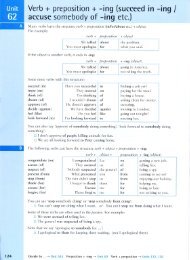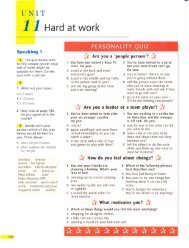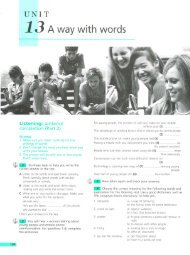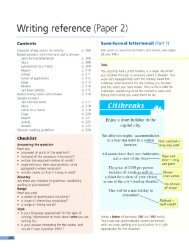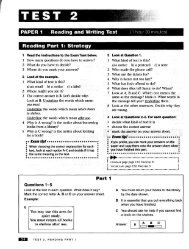All I want is .................... quiet.
All I want is .................... quiet.
All I want is .................... quiet.
- No tags were found...
You also want an ePaper? Increase the reach of your titles
YUMPU automatically turns print PDFs into web optimized ePapers that Google loves.
I7, Possessive 's and ofThe position of the apostrophe <strong>is</strong> important:my brother's friends (: one brother)my brothers'friends (= more than one brother)When we speak we sometimes omit the second noun:I stayed at Shnon's. (house <strong>is</strong> omitted)I went to the ilent<strong>is</strong>t's. (surgery <strong>is</strong> omitted)I stopped et the newsagent's (shop <strong>is</strong> omitted)We use 's with people, countries and animals:The girl's clothes were very dirty. (not @Britain's roads get more uowded euery year.I tripped ouer the dog's tail.and with time expressions:I <strong>want</strong> to go on a week's holiday.That's last year's brochure.but we usually use oyf instead of 's with things:Whst's the price of that holiday? (nottkehel:+da/sfiee'12 Reflexive pronounsmyself yourself himself herself itself ourselves themselvesWe use a reflexive pronoun:o to make it clear that we are talking about the subject of the verb:Tim hurt hhnself whm he fell off h<strong>is</strong> bilee. but Sam cried when Tim hurt him.(= Tim hurt Sam)Amy blamedherself for what hadhappened.but Amy blamedher for whathadhappened. (= Amy blamed another person, nor herself)i for emphas<strong>is</strong>:I went to th<strong>is</strong> place myself to see what it was really lilee.o with a number of common expressions like by (your)self, enjoy (your)self,behaue (your)self, help (your)self, make (your)self at home:Help you.rself to some brochures.It's got eueryhing you need to enjoy yourself.A We don't usually use a reflexive pronoun after wash, shaue and dressbttwe can for emphas<strong>is</strong>:She dressed quiclely. but The lixle girl managed to dress herself quicLely.(= it was difficult for her)n
IntroduçãoEconomias permanentesmediante Eficiência Energética AtivaHoje não resta dúvida que a eficiência energética ocupa umlugar destacado nos planos de uma grande maioria. No entanto,a compreensão do que envolve a eficiência energética e decomo implementar iniciativas de economia de energia fezcom que, algumas empresas, ta<strong>is</strong> como a Schneider Electric,defin<strong>is</strong>sem do<strong>is</strong> tipos de conduta de eficiência energética:Eficiência Energética Passiva e, ainda ma<strong>is</strong> significativamente,Eficiência Energética Ativa.Muitos acham que medidas de energia remetem à consideraçãode questões térmicas relacionadas ao material de construçãoe medidas ta<strong>is</strong> como <strong>is</strong>olamento, envidraçamento e soluçõescontra a perda de calor. Outros consideram que o assunto é ma<strong>is</strong>relacionado à iluminação e requer simplesmente a instalaçãode s<strong>is</strong>temas de baixo consumo. Aqueles que prec<strong>is</strong>am de muitaenergia térmica talvez considerem como solução os s<strong>is</strong>temaseficientes de caldeira.Todas as ações mencionadas acima são louváve<strong>is</strong> e necessárias,mas não deixam de ser medidas passivas, que reduzem em muitoa perda de energia sem diminuir a energia utilizada.A Eficiência Energética Ativa requer não somente a instalação deaparelhos que economizam energia, mas também o controle dosmesmos para uso da energia necessária. O aspecto do controleé essencial para alcançar a máxima eficiência. Vejam o exemplodas lâmpadas com eficiência energética que permanecem acesasem salas vazias. O único resultado positivo é que se desperdiçamenos energia do que com uma lâmpada comum — só <strong>is</strong>so!As mudanças permanentes são fruto da gestão do uso da energiamediante a realização de medições, monitoramento econtrole. Além d<strong>is</strong>so, em comparação com os custosincorridos (e conhecimentos técnicos necessários paraevitar r<strong>is</strong>cos) na instalação de soluções térmicas, oscontroles de energia podem ser implementados a umpreço relativamente baixo e com rápido retorno doinvestimento. Isto também é certo quando levamos emconta os preços da energia em ascensão — o preço damaioria das soluções de controle de energia pode seramortizado em poucos anos.Outro fator muito importante, que deveria dar ummaior impulso à Eficiência Energética Ativa a partirde agora é a necessidade de cumprir ambiciosasmetas de redução do carbono estabelecidas pelosgovernos aliados ao Protocolo de Kyoto. Em relaçãoao ambiente construído, por exemplo, sabe-se que,afora o caso dos edifícios ex<strong>is</strong>tentes (além de todosos novos) construídos com eficiência energética, serásimplesmente impossível atingir as metas estabelecidaspara 2020.Transporte27%Residencial16%Comercial8%Industrial49%Eletricidade38%Combustíve<strong>is</strong>62%Eletricidade50%Combustíve<strong>is</strong>50%Eletricidade17%Combustíve<strong>is</strong>85%49% Calefação16% Aquecimento de Água7% Iluminação7% D<strong>is</strong>sipação do Calor5% Refrigeração5% Cozinha4% Eletrônica4% Máquina de Lavar/Secadora3% Outros23% Calefação17% Iluminação10% Aquecimento de Água8% D<strong>is</strong>sipação do Calor6% Eletrônica5% Refrigeração4% Ventilação4% Cozinha23% Outros40% Calor de Processos27% Caldeiras de Vapor13% S<strong>is</strong>temas de Motor5% Calor da Instalação4% Iluminação e Outros4% Cogeração (CHP)2% D<strong>is</strong>sipação do Calorde Processos4% Cozinha5% OutrosOs valores de consumo energético revelam asprincipa<strong>is</strong> áreas de uso da energia por tipo4 - White paper sobre Eficiência Energética
8 Each and everyEach and euery can be used with the same meaning:Eaery / Each apartment has a balcony.but sometimes they have different meanings:c Each <strong>is</strong> used for individual things or people in a group:Each child drew a picture of her own parentsThe custonts officer checleed each passport in turn.; Euery emphas<strong>is</strong>es that all the people or things in a group are included:Eaery brochure you'ue shown me ...Each @ut not euery) can be followed by of + a plural noun or pronoun:Each apartment / Each of the apertments / Each of them has a balcorry.(not Ftery ef the epertments / evqA Notice the difference between euny and all:He sat by the riuer euery morning. (= regularly)He sat by the riuer all morning. (= one complete morning)9 Both, neither, either and noneWe use both, neither and either when we refer to two items:Both places are too no<strong>is</strong>y. or Both (ofl the places ... or Both of them ...Either / Neither place suits me. or Either /Neither of the places ... orEither / Neither of them ...A Note that with plurals we can omit o/after both but not after eitheror neither.We can use both / neither / either alone:Which holiday would you prefer? Either. / Neither.Which holiday did you enjoy? Both.We use both ... and / neither ... nor / either ... or to connect two things oractions:Both the Hotel Flora anil the Hotel Princess hate a good resteurant.Neither the Hotel Flora nor the Hotel Princess has a restaurant.I'd lilee to stay at either the Hotel Flora or the Hotel Princess.None means 'not any' and <strong>is</strong> usually followed by a singular verb, but a plural<strong>is</strong> also sometimes possible:None of the apartnxents has / ha:ue a balcony.None of themhas/harc abalcony.95
Ififf in the gaps with it <strong>is</strong>, there <strong>is</strong> or there are.it1Sometimes I dream of a place where I'd like tolive. ................11..:s............... (1) at the top of amountain and on the south-facing sidebut .................(2) a little house.(3) very pretty and(4) flowers all around it.(5) no other houses nearby(6) lots of sheep andgoats and wonderful vegetables growing.(7) always sunny and warmand it only rains at nighe ... . . . .... (8)not far from a little village where(9) a restaurant whichserves my favourite food. Unfortunately,'.\r.(10) just a dream!t1,tdt4Lrrll +*F {lEt" seven of these sentences there <strong>is</strong> a m<strong>is</strong>take. Underline each m<strong>is</strong>take and writethe correction.1 Whg one god neoding ihof? It's gesfendogs' newspoper. ...........y.(-s.t%A*y.'.:2 Thecot's fon wos sooking wef becoctse it hod been siffing in fhe wef gnoss.3 Mg violin lesson wos concelled becouse the con of rng feochen wooldn'f stont4 Nobodg wonted to corne fo fhe cinerno with rne so I wenf on rngself5 We neollg enjoged us when we went to fhe foin lost weekend,6 I'Ag rnothens' job <strong>is</strong> neollg infenesting - she wonks os o foshion designen7 When I sow hirn folll neollg fhought he hod bnoken the leg.S Mg coctsin neven behoves hirnself when he goes to ofhen people's hooses.9 Sirnon osked sorne fniends of hirn to help hrrn rnove house.10 -Ihe college decided io pobl<strong>is</strong>h the sfodenfs'nesolfs in the newspopen becodse iheg hod olldone so well. ...............96
! Utta"rhne the most suitable words.I'm going to tell you about aparty game you might <strong>want</strong> to play. It's a gameImost /most o/(1) people would enjoy and it's a good way for people to getto know ea.ch other / themselues (2) when they first arrive. There <strong>is</strong> a pile of cardsand all/ euny (3) card has the name of a famous person on it. Euery / Each (a) ofthe famous people has a partner, for example, Romeo's partner <strong>is</strong> Juliet. It'simportant that they're people that all/ eueryone (5) has heard of. Euryuw /Sompone (6) has one of these cards pinned to their back and they have to find outwho they are by questioning euery / all tlw (7) other people in the room. The firstpair to frnd one dtlothsr / tlle other (8) gets a pize. Thc whole / <strong>All</strong> tlw (9)game takes about twenty minutes and by the end nobody/ anybody (10)<strong>is</strong> feeling shy any longer.Co-plete these sentences describing the three brothers, Peter, fohn and Rob.Use the words in the box.ld:ligst1|{r::iiirlr:liir';it:i,l:i:r;r:irfr'.g'3$,1 Both ......J.Phn..... and2 8oth...................... andK.qh..Ls.v.s...fri!:[.rrirWrite sentences about your own family or three of your friends.7 Both...................... and97
Use of Engl<strong>is</strong>hArni. task tsrsgrammar from therest of the bookas well as theFor questions 1-15, read the text below and think of the word which best fits each .,,;sffil|ilspace. Use only one word in each space. There <strong>is</strong> an example at the beginning (O).NAMESlf, like me, you are called John Smith and you live in England, you have the same name(0) .......*:........ thousands of other people. When I was a child, I thought that(1) ...... ............ in the world had a different name and I had a name of my (2)but as (3) .................. as I went to school I real<strong>is</strong>ed that I was wrong because I found(4) ... ............... were two other boys with my name. ln fact, one of them became a closefriend of (5) ..... ............. .When I meet someone for (6) ..................... first time, they often think that they have metme before somewhere, but then they real<strong>is</strong>e that in fact they are thinking of somebody(7) ....... ............ - another John Smith. lf I say my name in a hotel or a bank, thereception<strong>is</strong>t often looks at me suspiciously as (8) <strong>is</strong> a name which peopleuse (9) they have to invent one quickly.Having met people (10) ..................... all kinds of names, I have decided it <strong>is</strong> better to havea common name rather (11) a very unusual one. (12) parentchooses a name they like but when I recently met two people called Honey Moon andHolly Bush I wondered (13) .................... their parents were thinking of. (14) ...................... ofthem appeared to mind having unusual names although they (15) agreed thatpeople sometimes did not take them seriously.98
WritingYour class has recently been d<strong>is</strong>cussing the advantages and d<strong>is</strong>advantages of the growthof international travel both for travellers and for the countries they v<strong>is</strong>it. Your teacher hasnow asked you to write a composition in 12G-18O words, giving your own views on thefollowing statement:lnternational travel <strong>is</strong> becoming easier, faster and cheaper for many people. ls th<strong>is</strong> good?Write your composition.Th<strong>is</strong> task gtves you a chance to pract<strong>is</strong>e:''iusi,ng'oll, mr$f asdsqrna,' e etc.f bbih:ieacharrd,,eg,ery,,@.,.aud:,r_t{r.,someofLe, there and it.Useful words and expressions',tah.qf"fi4r,,,ta ,,t',,g{',t6'. 'tb,Wratar'to:,'i, e,''to spoi,labrapd, econaTny, q;wit gft4 lfoUr@:,8&d/""'' :: '::" 'r' ':r' ' :"'. ':0ntlw onehand, onthe otherh.andl...:-'l99
tl Vo" are going to hear a conversationbetween Chr<strong>is</strong> and a girl calledAlice. Look at the picture of Chr<strong>is</strong>.What <strong>is</strong> h<strong>is</strong> iob?E m L<strong>is</strong>ten and check if you were right.E m L<strong>is</strong>ten again and answer these questions.2 How many rich and famous people does Chr<strong>is</strong> meet?4 How <strong>is</strong> th<strong>is</strong> job different from Chr<strong>is</strong>'s last job?E m L<strong>is</strong>ten again and match the beginnings and endings of these phrases.Stop the recording when you need to.1 ... you need ...-e-..2 Chefs have ........3 I needn't ........4 You don't have ........5 I need ........6 I have ........7 I had ........8 I'll have ........9 I must ........10 You must ........a think about the hotel kitchen today.b to work every day except Monday.c to spend their time in the kitchen.d come to the hotel one day.e to talk to me ...f to work longer hours.g to work all day ...h go now.i to get up early.j to stay until all the food <strong>is</strong> cooked and served ...fl fook at your answers to Exerc<strong>is</strong>e 4. Which verbs aren't followed by to?100
I Use of modalsThe modal verbs can, could, may, might, must, ought to, shall, should, willand would:a are always used before another verb:He can swim.I never change - they do not.add -s or -ed or -ing.. are followed by a verb in its infinitive form without ro:You shoulil get up earlier. (not@but notice that we say:You ought to get up earlier.I are immediately followed by not in the negative:You shoulil not (or shouliln't) be late for college.but notice that we say:You ought not to be late for college.c go immediately before the subject in a question:Coulil you walee me up?Need can be a modal verb as well as a main verb (> See Grammar, part 3).2 ObligationMust and have tornusf + verbWe must leaae now.must .,, + verb? Must we lcaae now?E ** tu / hltsfo + verb He lws to lcoue rww.y' a" I does ... + h.ape ro + verb? Do we haw to leante now?For obligation, we can often use nn$t or haue to:I must go now or I'Il m<strong>is</strong>s the bus. or I haue to go now or I'll m<strong>is</strong>s the bus.We use rnust to give orders or sffong advice, including to ourselves:You must tell me everything. (= I feel strongly about th<strong>is</strong>)She must be home by midnighr. (= these are my instructions)You ntust come to the hotel one day. (= I strongly adv<strong>is</strong>e you to)I m:ust go now. (= I have decided to do th<strong>is</strong>)When there <strong>is</strong> a rule or where the obligation does not come from thespeaker, nu.Lst <strong>is</strong> possible brt haue to <strong>is</strong> more usual:You ha:ve to pay to park your car here. (= th<strong>is</strong> <strong>is</strong> a rule)I hane to stay until the food <strong>is</strong> coolzed. (= th<strong>is</strong> <strong>is</strong> part of my job)We usually use haue ro for habits:I haae to get up early to coole breakfast.He has to pract<strong>is</strong>e the piano for twenty minutes a day.101-
-l-)tlWe only vse rnust in the present tense. In all other tenses, we use ha:ve to:I hail to work euery day. (past simple)I'll (will) hare to worle longer hours, (future)I auoided hauing to speak to him by nossing the street. (verb + -ing)If I got the job, I'il (utoulil) ha:ve to buy o car. (conditional)Mustn't and don't have toda / itaes twt lww to + verb We ilon\ lwe to bc earty.Although nust and haue to both express obligation, mrtrstn't and don't haue tohave different meanings. Mustn't means 'don't do it' and don't haue to means'it's not necessary to do it':I mastn't wear jeans at worle. (= it <strong>is</strong> wrong to do th<strong>is</strong>, it <strong>is</strong>n't allowed)You don't haue to stey at school until you're 18. 1= you are not obligedto but you can if you <strong>want</strong>)ShouldWhen we are talking about the right thing to do, we rse should:He shoulil talee more care when he's cycling. (= it's a good idea but he doesn't)I shouliln't spend so much time watching TV. (= it's a bad idea but I still do)To talk about the past, we use should haue + past participle:I shoulilha:ue told the truth. (= it was a good idea but I didn't)We shouliln'tharye lent her that money. (= it was abad idea but we still did)(> See also Unit 13, Grammar, part 5)3 NecessityWe can use need like a normal main verb in all the tenses, but it can also bea modal verb in questions and in the negative:Neeil I come with you? (= Do I neeil to conxe with you?)I needn't come. (if I don't <strong>want</strong> to) (= I ilon't need. to come. / I d.on't ha.nteto come,)In positive statements, we say:I need to con'Le. (not l-need-eome.)To talk about the past, we say:He neeileil to buy sorne food. (= it was necessary because he didn't have any)He iliiln't need to buy any food. (= he didn't buy any food as it wasn'tnecessary)A Needn't hauehas a different meaning:He neeiln't harc bought any food. (= he bought food but it wasn't necessary)LO2
Iniff in the gaps with the correct form of haile to or rnust.1 Most students in Britain .............1r9y.9..-1q......... pay at least part of their university fees.2 Joe get up early on Fridays as he has no lectures in the morning.3 You talk during the film because other people will get annoyed.4 These library books are overdue so I ........... .-...pay a fine when I return them.5 |eremy drive to work because the bus gets there too late.6 Because she could already play the piano, she ................ . pract<strong>is</strong>e much whenshe learnt to play the organ.7 You borrow th<strong>is</strong> video - you'll enjoy watching it.8 ................... $rou) wotk every Saturday in your new job?9 Non-swimmers go into the deep end of the pool.10 You come to the rehearsal tomorrow if you <strong>want</strong> to be in the play.11 When I was a child, I ...................... change schools seven times because myparents moved house a lot.12 Every morning the children ..................... feed their rabbit before school.13 I ............. .... stop eating so much chocolate or none of my clothes will fit.L4 They've prom<strong>is</strong>ed to lend me a tenn<strong>is</strong> racket so I ............... .. take mine.fl fUatctr the beginnings and endings of these sentences.L I shouldrL't ..9...2 Need I ........3 We don't need ........4 They needn't ........5 He should ........6 Should you ........7 He needs........8 Do they need ........a wear a helmet when he's cycling on a busy road.b to take any money or <strong>is</strong> it free?c to ask h<strong>is</strong> boss before he leaves the office.d take sandwiches with them because Jenny's cooking lunch.e to send them our new address because they already have it.f fill in my application form now? I'm busy at the moment.g spend so much time playing computer games.h carry that suitcase with your bad back?103
'l -)llll nead th<strong>is</strong> article about a pop star.The diary columnPopstar Lee Divine travelled from London to NewYork yesterday by plane. Lee had v<strong>is</strong>ited h<strong>is</strong>hairdresser before he went to the airport and woreh<strong>is</strong> latest designer clothes, as he likes to look h<strong>is</strong>best in photos. Press photographers usually followhim wherever he goes but the weather was very badyesterday and, to Lee's oLrvious d<strong>is</strong>appointment,there were no photographers at the airport. Becausehe <strong>is</strong> famous, he didn't stand in the queue and h<strong>is</strong>bodyguard carried h<strong>is</strong> luggage for him. Althoughmost people have to walk frorn the car park, Lee hasa driver who drove him right to the door. Even th<strong>is</strong>did not seem to make him happy. Lee got ^ngrywith h<strong>is</strong> driver on the way because he said shewasn't driving fast enough. Of course, they arrivedat the airport in plenty of time.Write six sentences about Lee Divine.1 H e n e e dn't h ave .Vi.5 rt€4 ...h<strong>is</strong>-..Mtfdf. -e.s*.,..2 He needn't haveLO4
Inewrite these sentences using the correct form of nutst, need., shoulil or haue to.It's her fault that she's lost her watch because she didn't look after it.I don't expect you to phone me before you come.It <strong>is</strong> essential for students to buy a good dictionary.It was wrong of you to take money from my purse without asking.I was getting ready to drive to the station to pick up my s<strong>is</strong>ter when she arrived in a taxi.It's not fair that I do the washing-up on my own.S'\I v*".,*r*,L /r'r\ .lcStudents aren't allowed to smoke in the canteen.She turned the music down to avoid d<strong>is</strong>turbing her neighbours but they'd gone out.SheI think she's wrong to make prom<strong>is</strong>es which she doesn't keep.She10 You can give the tour guide a tip but it <strong>is</strong> not necessary.105
-l-)tlReadingYou are going to read a magazine article about working in offices. Choose the mostsuitable heading from the l<strong>is</strong>t A-l for each part (1-7) of the article. There <strong>is</strong> one extraheading which you do not need to use. There <strong>is</strong> an example at the beginning (0).ABcDEFGHIA problem often overlookedGet regular restManaging your mealsMore than just keeping fitChanging your mindEffects on othersA variety of health problems that can be solvedLearning to enjoy exerc<strong>is</strong>eA modern problem106
Find your energy again0 I {f:,,:.1The offices thqt most of us work in oren't the most heolthyploces in the world. lf you work in o building thot <strong>is</strong> morethon 50 yeors old, it moy not be perfuctly designed for theoffice environment but it <strong>is</strong> probobly heolthier thon onebuilt recently. Even the best designed of todoy's officesrepresent on ortificiol environment where it cqn be difficuhtrc strcy positive ond bursting with energy.LComploints obout feeling tired, no energy, no interest infood, heodoches ond bockoche ore commonploce.Office workers often soy thot these heolth problems orethe inevitoble consequences of working in on office.However, th<strong>is</strong> <strong>is</strong> not the cose. While there moy be littleyou con do obout the ever-ringing phones or thetempers of your colleogues, you needn't feel unwell.There <strong>is</strong> plenty you con do to restore those energy levelsond feelings of well-being.2The first thing you must oddress <strong>is</strong> tiredness. lf ot theweekend you stoy up oll night doncing or going todinner porties ond sleep oll the following morning, youcon't expect your body to odiust on o Mondoy morningto o completely different routine. Some people seem tokeep th<strong>is</strong> lifestyle up without ony trouble but for most ofus it <strong>is</strong>n't o good ideo.gOur diets ore onother woy we m<strong>is</strong>treot ourselves. Monyoffice workers soy they don't hove breokfost - but youreolly should eot something, however smoll, before youleove the house. And if you're busy over lunch or hoveto go shopping, il's possible to forget thot too. So youget to the evening ond suddenly reol<strong>is</strong>e how hungry youore. Th<strong>is</strong> <strong>is</strong> o d<strong>is</strong>ostrous woy to mqnoge (or not monoge)your diet. Nothing <strong>is</strong> more importont thon eoting onddrinking regulorly.You should olso do o session of exerc<strong>is</strong>e once or twiceo week in the evenings. Th<strong>is</strong> will help you to get to sleepond woke up refreshed in the morning. RecentAmericqn reseorch hos estobl<strong>is</strong>hed thot regulor,vigorous exerc<strong>is</strong>e <strong>is</strong> o good woy of improving yourmood ond thot the effects lqst for longer thon thesession itself. lt does hqve to be vigorous though -wolking or tenn<strong>is</strong> hove to be kept up for ot leost on hourto hove o positive effect.5<strong>All</strong> the odvice on exerc<strong>is</strong>e soys thot you should choosesomething which you like doing. To th<strong>is</strong>, mony peoplereply: but I don't like doing ony form of exerc<strong>is</strong>el Mostpeople stort off with the intention of exerc<strong>is</strong>ing but soonlose interest. The onswer here <strong>is</strong> you must do it until youget so used to doing it thot you m<strong>is</strong>s it when you don'tdo it. ln order to motivote yourself, you need to keepreminding yourself of the odvontoges.Ilf you're working in on office with no noturol light, youshould go out for o wolk for ot leost holf on hour o doy,even when the weqther <strong>is</strong> dull ond roiny. The importonceof spending some time in doylight <strong>is</strong> often ignored. Wenow know thot lock of sunlight con couse depression. lt<strong>is</strong>, however, something thot needn't hoppen becouse itcon eosily be overcome.7,You moy be bothered by some of your colleogues' bodtemper or loteness. Think obout how their behoviourinfluences your own stote of mind ond remember thotyou don't need to behove in the some woy. You oremuch more likely to enioy your evening or weekend ifyou leove work feeling positive ond it's the some for yourcolleogues.LW
'l -)".ttLoolc at these sertences and find expres$ions in the text w-hich mean the same.I It <strong>is</strong> not necxsary for fou ro fbel ill. . :1...fi4l*nqpllr2 It <strong>is</strong> essential first of all for you to deal with tiredness.3 lt <strong>is</strong> important that you exerc<strong>is</strong>e at least once a week after work.4 It <strong>is</strong> essential to walk or play tenn<strong>is</strong> for at least an hour.5 It <strong>is</strong> important that you do a form of exerc<strong>is</strong>e that you enjoy.678It <strong>is</strong> esi€ntial thatIt <strong>is</strong> necessary that you don't forget the positive things.It<strong>is</strong>ootnecessaryforyoulobehavi.l1ikcth9IIl''.''.'.''.''....illiIi108
WritingYou have been studying at a college in Britain for the last year. You live in a room in thecollege hostel. A friend of yours <strong>is</strong> coming to stay in the same college and has written you aletter asking you about the hostel. Read the letter, the college rules and the notes you havemade. Answer your friend's questions. You may add any relevant ideas of your own.Write a letter in 12o-180 words in an appropriate style. Do not write any addresses.I realll war(. to L-now abor^Ith,e colleSe l,osLel. Are IkereMa^1 ruleS abo"'t wkat \Dekave to do7 u.)Xrt do T needto brinl witk me7 Can ,jo,repll soot as T arn leavnnlin Iwo weeLs.9ee 1o"soot.Ckr<strong>is</strong>RuIesPay rent in advanceOrder meals 24 hours beforeHostel locked at midnightNo music after midnightNo smokingNeussrySwimmitg thiryswarm clotlvs \pstel etd)Not rv.cessryTawlsSlvetsCoFFoa wskerTh<strong>is</strong> task gives loua chance to pract<strong>is</strong>e:usingimodal'verbsto:talk abodt ;bligation (rules) and necessity (what do youneed).Useful words and expressionsahhough, because, iniduance, otherw<strong>is</strong>e, so, ward.en109
ll vo,r are going to hear a teenagegirl called Sophie asking hermother to do five things for her.What do you think Sophiemight ask?E mSophie says:1,2345L<strong>is</strong>ten and write Sophie's questions. Were any of your guesses right?.wil l...y.o*.. lcnA . : .M.*t.an.. Wrrnds ?Her mother agrees (/) ordoesn't agree (/Q:E ffi! L<strong>is</strong>ten again and put a tick (/) inExerc<strong>is</strong>e 2 if Sophie's mother agrees to dosomething and a cross (X) if she doesn't agree.E @d L<strong>is</strong>ten again. Sophie asks her mother two things for a second time at the end ofthe conversation. What does she say? Why does she ask differently the second time?{..110
1 Asking for and giving perm<strong>is</strong>sionWe can ask for perm<strong>is</strong>sion by saying: Can I? Coulit I? or May I?C:: !leaue my bag here white I look round the museum? (= a simple requestryhichexpects the answer yes)coulil r borrow your car.for a few d.ays? (= more polite or a request which <strong>is</strong>less sure of the answer being yes)May I sit here? (= a more formal'request, particularly to a stranger)We usually answer by saying:Of course (you can). / OK. / Certainly.fm afraid not. (= polite) / No, you iant, 1= not very polite)May <strong>is</strong> often used in written notices to say what <strong>is</strong> or <strong>is</strong> not alrowed:\!" *oy bonow six booles from the library.You may not Leeep any boole for longer thin three weeles.2 Making requestswe use can you? and, win you? to ask someone else to do something:Can you pass me the bread?Will you get me some stanlps from the post office?To be more polite, we use Could you? and Would you?:Coulil you tell me where the station <strong>is</strong>?Would you lend me your camera?We usually answer by saying:Of course (I can / will). or OK.I'm sorry I csnt. (notl@-tort\, which sounds rude)A We never :use May you? to ask someone to do something.(not@3 Making offersThere are several ways of offering help to someone else:Can I / ute help you to coole dinner?Shall I / ue cleqn the car for you?I can / I could / I,ll lend you some money.Why don't I carry thar bag for you?LN
-l -t:.J4 Making sutlgfestionsTo make a suggestion, we can use all the following expressions:Shall I / weWlryilon'tI/weLet'sHow aboutWhat aboutgo by bicycle today?If we are less sure of what we are suggesting, we can say:We coulil so by bicycle today.5 Giving orders and adviceTo give orders and advice, we use:nust had better ought to/should couldstrongless strongYou really must st&rt looking for a job. (= an order - I am telling you to doth<strong>is</strong>, or th<strong>is</strong> <strong>is</strong> my opinion which I feel very strongly about)You'd better start looleing for a job. (= advice - otherw<strong>is</strong>e you may regret it)You shoulil / ought to start looking for a job. (= advice)You could stert looleing for a job. (= th<strong>is</strong> <strong>is</strong> only a suggestion)In the negative we use had better not and oughtn't to / shouldn't:You'd better not forget to post that application form.You shouliln't / ought not to wear those clothes for the interuiew.A We don't use nutstn't or couldn't when giving advice.To talk about the past we say:You shoulilha:ve / ought to have accepted that job. (= it was a good idea toaccept but you didn't)In the negative we say:You shouliln't haue / ought not to ha:ve worn those clothes. (= you wore thembut it wasn't a good idea)We can use all these verbs to talk about the right thing to do:I must try harder not to be late.She shoulil / ought to be more thoughtful.He'd better go and say sorry.I'il better not upset her today.They shouldn't / ought not to talle so rnuch.To talk about the right thing to do in the past we say:They shouldn't haue / ought not to haae talleed so much.(> See also Unit 12, Grammar, part 2)LL2
Iriff in the gaps in these sentences.1,2345678910.......C..*n...... I change traveller's cheques here?I'm sorry to bother you. ...................... I look at your timetable, please?cycling to town today for a change? It will be good for us.We ...................... ask Paula if she'd like to come riding with us. What do you think?I know she'll enjoy it.you get that tin down from the shelf for me, Dad? I can't quite reach.L..................... post your parcel on my way to work if you <strong>want</strong>.We haven't got any plans th<strong>is</strong> weekend so ...................... we go sailing? The weather'sgoing to be fine.Excuse frer ...................... you tell me where the nearest tube station <strong>is</strong>?A: '...................... I take th<strong>is</strong> bag onto the plane?'B: 'No, I'm afraid not.'you turn that telev<strong>is</strong>ion down? I need to use the phone.fl naniel runs h<strong>is</strong> own business. He <strong>is</strong>n'tvery tidy. Tomorrow an important client<strong>is</strong> coming to v<strong>is</strong>it him in h<strong>is</strong> office. Givehim some advice, using at least fourdifferent structures and the words inthe box.coat cups filing cabinetlampshade telephonewastetaperbin' 'window r r:'' ""i" :'!'(\)FTI2)s*l4 kttet.Ji4y -tk 4-a:!r345678113
.lI"'-',.-,"*-r))p Eil in the gaps with thephrases in the box.Can I do €q1E :, Could,..[see I'q,,o&Qid,,,,,,,Shall I ask Would you exchange You can't haveSpu'could give,';SnuS: bett€frl:,rtot,,,,. r,,,,,1&rl,lor*dl ask "';'].Ass<strong>is</strong>tant:Laura:Ass<strong>is</strong>tant:Laura:Ass<strong>is</strong>tant:Laura:Ass<strong>is</strong>tant:Laura:Ass<strong>is</strong>tant:Laura:Ass<strong>is</strong>tant:Lauta:Ass<strong>is</strong>tant:f*n...l..t"dP (1) you?I'd like to have a refund on a CD which I was given as a present............. (2) that here?Yes you can. I'11 do it for you. ..............;;;;;.rules, I'm afraid.(3) the receipt, please?........... (4) not. I haven't got one' vou see' because it was(5) a refund without the receipt. Those are the,,;; ;; ;; ;;;, ;;; ;;;,$:# ;T:'};X JilffJ;............ (7) that if you <strong>want</strong>ed to return it.Chr<strong>is</strong>tabel did it before she gave it to me.Did you say Chr<strong>is</strong>tabel? Does she work here at weekends?I don't know. She's got dark hair and glasses.(8) her where she got th<strong>is</strong>. She was probablygiven it free because it has no wrapping. .................. (9)*:-"""* *n':o:*tlo,;0,do that. r don,t <strong>want</strong> to get her into *oubre.(11) it to someone else for their birthday, I suppose.LL4
!l W,"t you would say in the following situations? Write sentences.L You have just started work in a new office and you <strong>want</strong> to know howthe coffee machine works. Ask someone.-ttp:+*..yrp-,...qp-*!4...yq* lsl w @ frs q..r.tp-a-...n*9hrr-..tipJ..hx.-p)g*?.2 Your s<strong>is</strong>ter has just moved into a new flat and you offer to help her clean it.3 Your friend <strong>is</strong> trying to decide what to buy her mother for her birthday.Give her some suggestions.4 Your brother puts lots of salt onto h<strong>is</strong> food. You don't think th<strong>is</strong> <strong>is</strong> a goodidea because too much salt <strong>is</strong> bad for you. What do you say?5 You <strong>want</strong> a book which you can't find in the bookshop. Ask the ass<strong>is</strong>tant to order it.6 You are buying something in a shop and you <strong>want</strong> to payby credit card.Ask the ass<strong>is</strong>tant if th<strong>is</strong> <strong>is</strong> possible.7 Your friend <strong>is</strong> always late because he doesn't have a watch although hecan afford to buy one. What advice do you give him?8 You have been at a party at a friend's house and the kitchen <strong>is</strong> in aterrible mess. Offer to help clear up.9 Your s<strong>is</strong>ter <strong>is</strong> going shopping. You need a new film for your camera.Ask her to get one for you.L0 You need a lift home. Your friend has a car but lives in the other direction.Ask him politely for a lift.115
- at::,:,a-LJ@ L<strong>is</strong>teningYou will hear five different people giving advice. For Speakers 1-5, choosefrom the l<strong>is</strong>t A-F who <strong>is</strong> speaking. Use the letters only once. There <strong>is</strong> oneextra letter which you do not need to use.A a neighbourB a teacherC a parentD a tour guideE a colleagueF a shop ass<strong>is</strong>tantSpeaker 1Speaker 2Speaker 3Speaker 4Speaker 5[-F]rrlt-l:tlnil[l*l116
:iWritingEvery term your evening class goes on a day-trip to a place of interest. Lastterm you were responsible for the arrangements. Your teacher has asked youto write a report on the trip, giving suggestions and advice for the person whowill organ<strong>is</strong>e the next one. Write your report in 12G-18O words.Tk<strong>is</strong> :teek gives ryor* a': chance'to practioe:using qqdal,verbs to make suggestions 1nd grve advice.Useful words and expressionsto,chet\ to rna.he sure, ta relrNi.nd. ,1. ,.,, , ,:cestle, rwtrssutn, gallery, t affic, ilelay, d<strong>is</strong>aster, probbrnhrckily, interestingin7
Ivoo are going to hear two collegestudents called Clare andFiona talking about a boycalled Danny. Before youl<strong>is</strong>ten, look at thepicture. Do you thinkDanny <strong>is</strong> sitting with h<strong>is</strong>s<strong>is</strong>ter, h<strong>is</strong> girlfriend orh<strong>is</strong> mother? ..........................E m L<strong>is</strong>ten and check if you were right.!l m L<strong>is</strong>ten again and answer these questions.1,2345Who does Clare think Danny <strong>is</strong> with at first?What do the two girls decide to do?\Alhy doesn't Fiona <strong>want</strong> to say hello?What do you think Fiona really feels about Danny?E m L<strong>is</strong>ten again and fill in the gaps.fl foot at the sentences in Exerc<strong>is</strong>e 4. In which sentences does the speaker:I seem sure that something <strong>is</strong> true?2 think something <strong>is</strong> possible, but <strong>is</strong>n't sure? ............118
1 AbilityCan and be able to - presentf*m,',,, !941rs*tn-, the ai*,lttwim':cunr,*r"**;r"lE -n ,,rore ablc to + verb t'rn abte to slrtnx.E om/<strong>is</strong>/are rwt able ro + verb He's rwt ahlc to swimy'*i"nore ... sblero + vetb? Are you ablc rc suhn?We use can or be able fo to say that someone has an ability:James can / <strong>is</strong> able to play chess but he can't /<strong>is</strong>n't able to ride a bicycle.Can and be able to - pastnH'calrld+'verb ''':;*16Y+a*"tw.ld...+ verb?I":'gslfl"'galatixs;' : :' :Shsi'c&t \.s inCodilyau'stltim7,',,',wdwere qbh to 1 *etb ",,,, I uns',&b ta'swim.wa.s/were twt oblc fo + verb I warsr,'t qhlc a swim.wa.s/werc ... ablc to + verb? Werc you eWe n suim?We use could or was able to to say that someone had an ability in the past:He coulil / was able to read when he was three but he couldn't / wasn't ableto catch a ball when he started school.A We do not use could to talk about one occasion in the past, but we canuse couldn't:She uas able to (notaAd) come to the meeting but she couliln't /wa.sn't able to stay for lunch.They uere able to (notrnrl.ld) see the rnatch because they had a day off.Be able fo - other tensesCan <strong>is</strong> only used in the present tense and could <strong>is</strong> only used in the past.In all other tenses we use be able to:I will be able to giue you a lift on my way to college. (future)They ha:ven't been able to contact Mary because of the storms.(present perfect)If you saued enough money, you woulil be able to u<strong>is</strong>it me in NewZe aland. (conditional)They hope to be able to u<strong>is</strong>it me next year. (infinitive)119
2 Deduction: certainty and possibilityTalking about the presentCertaintyWe use:a must when we are sure something <strong>is</strong> true:It mast be from Steuen because he's in Australia.(= I am certain it <strong>is</strong> from Steven ...); can't / couldn't when we are sure something<strong>is</strong> not true:It can't be / couliln't be f'rom Steuen because that'snot h<strong>is</strong> writing. (= I am certain it's not from Steven ...)PossibilityWe use:Susie <strong>is</strong> looking at a letter with an Australians might / may / could when we think somethingstamp which has just arrived for her father.<strong>is</strong> possibly true:The lener might be / may be / coulil be from Dad's friend, Tony, because hemoued to Australia recently. (= I lenow Tony liues there and it <strong>is</strong> possible, notcertain, that the letter <strong>is</strong> f"rom him)t might not / rnay not when we think something <strong>is</strong> possibly not true:It may not be / might not be from anyone that we lenow. (= it <strong>is</strong> possiblethat it <strong>is</strong> not)Present True Not trueCertainw musr + infinitive without ro canl/could.nl + infinitive without toPossibiliw m<strong>is</strong>ht/ntoy/coald + infinitive without to m<strong>is</strong>ht rct/m$/ not + infinitive without to[, Notice that could means the same as might and may,but couldn't <strong>is</strong> different from might not and may not.<strong>All</strong> the verbs in the box above can also be followed bybe+verb+-ing:Steuen might be trauelling home at th<strong>is</strong> rnoment.Talking about the pastCertaintyWe use:a nrust haue when we are sure something <strong>is</strong> true:Steuen m.ust hale aniueil in Perth by now.(= I am certain he has arrived ...)) can't / couldn't haue when we are sure something <strong>is</strong>not true:He cant't / couliln't harc got there yet because it willtalee at least two weeles. (= I am certain he hasn'tgot there ...)Steven <strong>is</strong> making a journey across Australia bycar from Sydney to Perth.LN
PossibilityWe use:t might haue / may haue / could haue when we think something <strong>is</strong> possiblytrue:He might / may / coulilhaae stoTtTteil for a few days on the wey.(= it <strong>is</strong> possible)c might not haue / may not haue when we think something <strong>is</strong> possibly nottrue:He might / may not ha:ve hail time to do euerything he <strong>want</strong>ed. (= it <strong>is</strong>possible he didn't)Past True Not trueCertainty mast hnte + past participle can\ haue/couWnI ha.pePossibilitymight have / may fuw e / c ould ha:ve+ past participle+ past oarticioleNotice that could haue means the same as might haue and may haue,butcouldn't harte <strong>is</strong> different from rnight not haue and may not haue.Talking about the futureWe also use might (not), may (not) and couldwhen we are not certainabout the future:lames might go out to see Steuen in Australia next month.might not haue/ma.y not hatte+ past participle3 ExpectationsWhen we expect something will happen, we use should (not) + infinitivewithout to:Steuen shoulil write to us soon. (= I expect he will write ...)It shouliln't be too long before we hear from Steuen. (= I expect it will nor betoo long...)We also use should when we d<strong>is</strong>cover that a situation <strong>is</strong> not as we expected:Th<strong>is</strong> letter <strong>is</strong> from Melbourne. Steuen shoulil be in Sydney. (= he <strong>is</strong> inMelbourne but I'm surpr<strong>is</strong>ed because I expected him to be in Sydney)When we talk about a past situation, we use should (not) haue + pastparticiple:He shoulilhmebft Alice Springs seueral days ago. (= I expect he ieft AliceSprings ...)He shouliln't ha:ue hail any touble finding places to stay. (= I expect hedidn't have any trouble ...)L21,
a.ua:u.uir,:irri:t,,:rr:a!:atriti.rl:- | ,1, r-JIfiff in the gaps with can(t), coulil(n't),or the correct form of be able to.Sometimes there are two possible answers.l The maths geniusfiyrn l(ennedy speaks to llicl Evans a[out h<strong>is</strong> amazing talent.'One day when I was four years old, my fatherwas telling my mother how much money he'dspent and whire he -Tl"Hlilz,fr?.l,fuil' ilThey didn't believe the(1) do that because I ....................... .... .. . (2)read or write. J'm now at university and I(3) stilladd up complicatedsums in my head" I did a maths exam once whichI fin<strong>is</strong>hed so quickly I ....................... (4)eat a meal in the canteen before the othershad fin<strong>is</strong>hed. Next year we have to writees$ays and I'm not sure whether I(5) do that because I(never) (6) spellvery well. I would like ................. (7)use my mathematical skill in a job but I haven'tdecided what yet. I ....................... (8) bea maths teacher- I'd enjoy the maths but I'm notsure about the children! I entered a maths quizshow on TV once but when they asked me thequestions I ....................... (9) tfrint< of tfreanswers because I was just too nervous. So I(10) imagine myself as aTV star. I ....................... (1.1) always getwork in the supermarket when the tills breakdown, lsupposel'fl Co-plete the sentences about the man in the picturewith some of the words and phrases in the box.&morrs. a {i}m star fit Greek,,,marrid rieh , aschoolbo)a,, $Pasi$a tEaqig chq$pion , 45,yiars''6ld ,I,ilrl,,i1 He might be2 He must be3 He might be4 He may be ..5 He can't be .6 He could be7 Hecouldn'tbe8 He must befanroustzz
! nead about what has happened on a camping trip.':iii+rtrtHere are some of the things their families say when they don't come back.1 There can't be much to eat on the <strong>is</strong>land.2 Someone may have noticed them rowing across the lake.3 They could be stuck there for days.4 A f<strong>is</strong>hing boat might see them.5 They must have forgotten how late it was.6 They must be getting scared.7 There may be a cave or hut they can shelter in.8 The boat could have sunk.9 Someone may have taken the boat.10 They can't have tied the boat up properly.Write the number of the sentences with their meanings, a or b.a I feel certain about th<strong>is</strong>. .1..............!| fiff in the gaps with a modal verb and the correct form of the verb in brackets.1.2]enny's brother .......................q4n.:+-..h4.......... .......... (be) a doctor because he's only 18.Samantha said she'd go for a swim as soon as she reached the seaside so she............ (swim) in the sea right now.I don't seem to have my wallet. I ...................... (leaue) it at homebecause I paid for my train ticket.A: I left Camilla a message on her answerphone but she hasn't rung yet.B: She ............... (not l<strong>is</strong>tm) to it yet. She usually has a showeras soon as she gets home from work.A: I found th<strong>is</strong> watch in the changing rooms.B: It .................... (be) Peter's. I think he's got one like that.I can't make the video recorder work. I ...................... ................ (do)something wrong. Where are the instructions?I can't think what's happened to Annie. She left home hours ago so she............ (bt) here by now.These football boots don't fit me any more. My feetn3.......... (gro*).
9 He remembers when there were fields here instead of houses so he...'... . (bt) verY old'10 A: I don't really like James. Why did you invite him?B: Don't worry. He ................. (not come) anryay He said he wasn'tsure what h<strong>is</strong> Plans were'fl nead th<strong>is</strong> police report about a stolen painting.A very small but valuable painting has been stolen from Sidcombe art gallery.we know it was stolen between 6.00 and 7.30 on Friday evening.There are several suspects. They all have keys to the art gallery::".,,,,t::r:'l*a!al:.lilWho had the opportunity to steal the painting? Complete these sentencesusing must haflZi c&n't ha:ve, could.n't haue, might ha:ve, may ha'ue and couldhaue.Use each structure once.1 Sam Will<strong>is</strong> ......nrght-..hay.q...:L9!-a.n........ the painting because ha..g*r:..-tln-z.f9....*nJ.:'J...9,?.-0-:............23456Sandra ThompsonDaniel ForemanSophie Chr<strong>is</strong>tieJosie McCartney...... the painting because..'... the painting because'..... the painting because...... the painting becauseu24
Use of Engl<strong>is</strong>hFor questions 1-1O, read the text below. Use the word given in capitals atthe end of each line to form a word that fits in the space in the same line.There <strong>is</strong> an example at the beginning (O).l.:i:rl;t:i::sl t,$:l&l*li".:r'.ii,r.;,.r..,gq4.S8{:,14:r ;:,tr,:ia'i:,.;t:rsii3 :iiiiillTHE WOMAN ON THE HILLA woman has lived in complete (O) ..i*-1.+I9.n.. in a large house on a hill in northYorkshire for the last fifty years. She (1)ISOLATEv<strong>is</strong>its the nearby village to order OCCASIONfood. She walks (2) down the main street but she only speaks to the CONFIDENCEdifferent shop (3) in order to ask for something. Apart from that, she ASSISTdoesn't speak to anyone at all. She receives a (4) ...................... of wood once ayear for DELIVERher fire but the van driver has (5) to leave it on the doorstep and go away. INSTRUCTShe must have been very (6)when she was young and her clothes were ATTRACTprobably (7) ...................... 50 years ago. She must be about 70 years old now.She gives the (8)FASHIONfrom the way she behaves that she might have been IMPRESSan (9) once. But nobody in the village knows who she <strong>is</strong> and they are ACT(1O) ...................... to find out unless she tells them.LIKEL25
*r!id!rr{a*6r;sil@rrt!ifI/l-jir;l&What do you thinlc the villagers say about the woman on the hill? Complete*dl€ gs'.using twt;; 1i ,(na$,r:.1y $tst)r.:Es'r,lib:&lr) or cqlt, l'r.'l'1.,i'.rl:.r.li'h"ppy. 5 .............................................. rich.,,:l:3 lonely. 6.,;,',;..,l1.,.,;.,.,.,............,.::.;;;1..;,]. |$(6g6p.{ngbaCkgfOUnd.WritingYou have just moved house. ln the attic you find a pile of letters written about 1O0 yearsago. You read the letters and decide to send an article to the local newspaper sayingwhat you have guessed about the writer's life. You hope someone who reads your articlemight know who wrote the letters. Write your article in 12O-180 words.u2a
IVoo are going to hear a radio news bulletin. Before you l<strong>is</strong>ten, look atthe pictures and decide what happened. Put the pictures in order.E m L<strong>is</strong>ten and check if you were right.f,l nead th<strong>is</strong> newspaper article.roun sutgll*s have escaped ftom custodyonly hourc after ................hring................ (1)sentenced to ten years in prieon, Theythe law csurts in llanchester to $trangewaysPr<strong>is</strong>on. they .............guitty of rteating electricat gootls and morsyfrom rhops in the Manchester area. Itwere all rnembers of the same gang. theyescaped from the van in which they(5) transported, when(6) forced tostop because of a tree across the road. It(7) betieved that thethe drivertree ......"......... . (8) ptaced there byother members of the gang, who. (9) informed of theroute .;.......,... .... (10) taken by thevafl. A full investigation of the events teadingto the escape (11)ordered and anyone with informationthe police to help with their enquiries.@L<strong>is</strong>ten again and fill the gaps. Stop the recording when you need to.!l Uo* many of the verbs you completed in Exerc<strong>is</strong>e 3 are in the passive? ......................
1 The passiveHow the passive <strong>is</strong> formedWe form the passive by using the verb to be followed by the past participle:Active:The police officer sa.u the robber at the airport.She's following him.She'll catch him soon.Passive:The robber was seen et the airport.He's beingfolloweil.He'llbe caught soon.Activeto catchto haue caughtcatchxnghaving caughtam/arc/<strong>is</strong> catchingcatch(es)will catcham / are / <strong>is</strong> going to catchhas/ho:ve cottghtcaughtwas catchinghad catrghtwould catchwoul.d haue caught++++Passiveto be caughtto Lnue bem ca:ughtbeing ccrughthavingbem caughta:rn/ are /<strong>is</strong> being caughtarn/ are /<strong>is</strong> caughtwillbe co;u.ghtam/ are/<strong>is</strong> going to be caughtfurc/hnue bem ca:ughtwas/werc caughtwasbeing caughthadbeen caughtwouldbe caughtwouldhane bem cattghtL28
When the passive <strong>is</strong> usedThe passive <strong>is</strong> used quite often in Engl<strong>is</strong>h, both in speech and writing.We use the passive when:o we don't know who or what did something:My bicycle's been stolen. (= Someone has stolen my bicycle.)The first tools were maile in Africa two million yea.rs ego. (= People madethe firsttools ...)r the action <strong>is</strong> more important than who did it:Income tex utas introil.uceil in England in 1798.r it <strong>is</strong> obvious who or what did something:The thiefs been aruested..We can use by + person/thing to show who does the action if th<strong>is</strong>information <strong>is</strong> important:The robber was seenby the police officer. (= Th" police offi.cer saw therobber.)Verbs with two obiectsSometimes an active verb (e.g. girte) has two objects:A witness geue the police some information.or A witness gaue somc information to the police.Either object can be the subject of a passive sentence:The police were giuen some information by a witness.or Some information wcLS giuen to the police by a witness.2 To have something doneWhen we ask someone else to do something for us, we often use thestructure to hque something done.It <strong>is</strong> not usually necessary to say who didthe action:The president hail the car taken to the airport (by h<strong>is</strong> driver).(= The president's driver took the car to the airport)I hail mry hair cut. (= The hairdresser cut my hair.)fm hailng my leitchen painteil. (= The decorator <strong>is</strong> painting my Leitchen.)They <strong>want</strong> to ha.ae their car fixeil. (= They <strong>want</strong> the garage to fin their car.)In informal speech, we sometimes use get instead of haue:I got my hair cut. (= I hail my hair cut.)L29
I,--lIJE f" five of these sentences there <strong>is</strong> a m<strong>is</strong>take in a verb form. Underlineeach m<strong>is</strong>take and write the correction.1 The childnen wcnted to be ollow fo sfog op lote ond see the finewonk., ..19...k...*llqt!94.......2 Our flight wos deloging bg fog ond we rn<strong>is</strong>sed oun connecfion. .................3 Loonen wos sulking becoose she hodn't been invifed to Rolph's ponfg. ............4 Bg fhe trrne we onnived ot fhe rnonket the best fnuit hod be sold.5 While fhe rneolwos being pnepore we hod o dnink on the tennoce.6 The new librong willbe opened bg the Mogon next Sofundog7 I con't see ong coffee in fh<strong>is</strong> ccrpboond. Wos it oll been fin<strong>is</strong>hedzllfiff in the gaps with the correct passive form of the verb in brackets.I2 It was a lovely surpr<strong>is</strong>e to find all the washing-up345A government min<strong>is</strong>ter ....................$.1*:...f.q*n4........ ............ (fi"d) guilty of fraud yesterday.while I was asleep.These souvenirsI didn't come here in orderThe votesbefore midnight.Th<strong>is</strong> parcel appearsAs heanother........... (do)............ (mahe) by children from the local school............. (make) a fool of!............ (count) right now and we should know the result(deliuered).The judges still have to decide which designthe top pize............. (open) before it............ (sacb) from h<strong>is</strong> previous job, he found it hard to get............ (award)130
ll nead th<strong>is</strong> report in the Cybernian News.CYBERNIAN NEWSt--Fr*--t f -IHome itku8 i Entertainment' Sport'Business:VideoReport WeatheriGoingOut WGuideVictory for GyberniaThe victorious Cybernian Inter-galactic Forces report:Yesterday we invaded Planet Upstart with a large force. We havecompletely crushed the year-old rebellion there. Our space ships havedestroyed ninety per cent of the Upstart space fleet. A special Cyberniantask force landed near the central communications building and captured itwithout difficulty. We immediately broadcast a message to the populationannouncing that we had liberated them from the illegal Upstart governmentand we called on them to cooperate with the new government of theirplanet. We have arrested the rebel leaders and we are taking them back toCybernia where the government will put them on trial.Fill in the gaps below with the passive form of the verbs in the Cybernian Nenls above.
lIJ't.J!l Uatctr the two halves of the conversations and fill in the gaps with the correct form ofthe verbs in brackets.1 I thought those chairswere broken.Your bike's gota flat tyre!Yes, you need(haue / take in).Th<strong>is</strong> carpet'sfilthy.I can ............(haue / fix) at the cycle shop.What's happenedto your hair?I don't like th<strong>is</strong> room.lt's too dark.These jeans aremuch too loose.\{hat a beautifulgarden!
Arrri, task testsgrarnmar from therest of the bookUse of Engl<strong>is</strong>has well as thegrammar inComplete the second sentence so that it has a similar meaning to the firstsentence, using the word given. Do not change the word given. You must usebetween two and five words, including the word given. There <strong>is</strong> an example at thebeginning (O).O My grandfather hasn't spoken to me since Sunday.spokeMy gra ndrather ...................!*:1...:.aglg...te...ng..p.nSunday.The students gave a concert after their exams.wasA concert........ students after their exams.The children played football and also went swimming.additionThe children played footballJane's neighbours looked after her flat while she was away.byJane'sSomeone forgot to hand my message in to the teacher.notMy message .....................; The teacher said Simon had cheated.accused........ swimming......... her neighbours while she was away.............. to the teacher.Simon........ h<strong>is</strong> teacher.i When we were children we often used to make fires in the garden.wouldAs children........ fires in the garden.He had said he'd help us so we were d<strong>is</strong>appointed when he didn't come.prom<strong>is</strong>edHaving........ help, we were d<strong>is</strong>appointedwhen he didn't come.8 No one was able to explain how the accident happened.notThe cause of ....................explained by anyone.133
-l J*L',-rMy computer needs to be repaired before the weekend.haveI need........ before the weekend.1O Th<strong>is</strong> part of the building <strong>is</strong>n't normally open to the public.oftenThe public........ into th<strong>is</strong> part of the building.lYhich of the serrtenqe$ te$t the passive?WritingYou see th<strong>is</strong> competitionin a magazine.You decide to enterthe competition.Write a compositionin 120-18O words.-. : - -:.frhyl"t&'l;Ji.h"n:"Describe how your town or rriltr^^ -^r^r-:Tir .";;;;.i. ";;i,.*,#,Xn"T'.1:"T.',:::, Ioecorated?What else can be seenanre i;; o;#;":* |ffii"*:l**:gg5" *i, *;;;;,i."::: ,how people celebrate'vru wll a ree tnp tcin o:^"Imer parts of the world. ' t"":":;:*-:_;:;;*;.^:._:::::;-::;,:;;;;r,*-.=...-,j,l,Th<strong>is</strong> taslc gives you a chance to pract<strong>is</strong>e:using the passive (for example, you can say things like the steets are ilecorateilbutit <strong>is</strong> not always necessary to say who does it).Useful words'rrnd expressiong,'::: , ;', 'i' ''to di.splay, to march, to organ<strong>is</strong>e, to planatmosphne, bafiaons, band, cosrumcs, f'lngs, f"lowns, parafubright, cheerfu\ colourful, lou.il, no<strong>is</strong>yL34


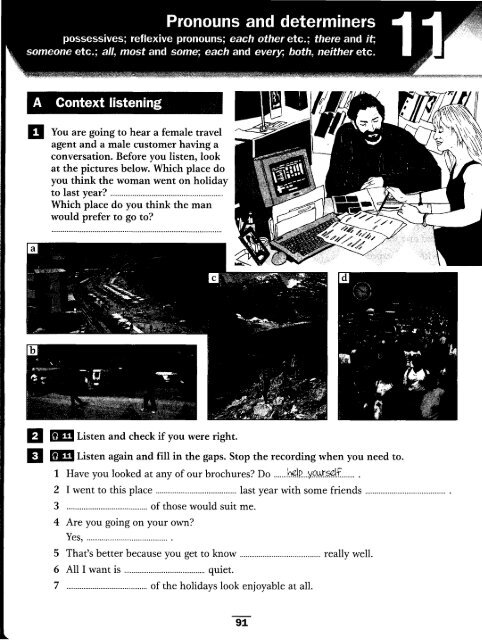
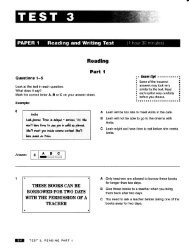
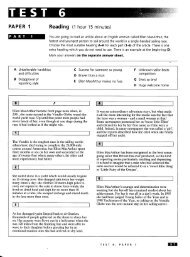
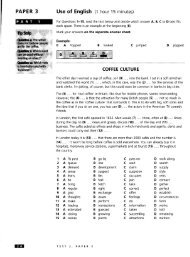
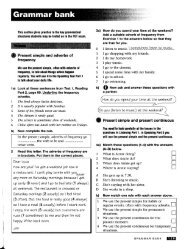
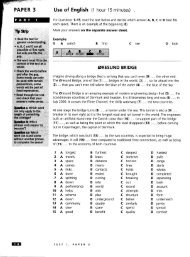
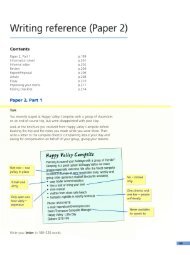

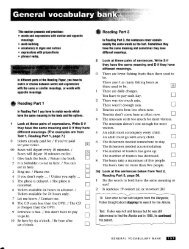
![T]NIT 9 A new look](https://img.yumpu.com/40125756/1/190x248/tnit-9-a-new-look.jpg?quality=85)
